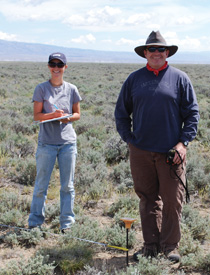
At Home on the Range
October 10, 2022

Jeffrey Beck with former graduate student Katie Taylor. (Courtesy image)
Professor Jeffrey Beck found his passion studying the West’s sagebrush ecosystem.
By Micaela Myers
University of Wyoming Department of Ecosystem Science and Management Professor Jeffrey Beck grew up surrounded by the West’s sagebrush ecosystem and remembers hearing about sage grouse at a young age.
“There’s something about studying this species that has never left me,” says Beck, who is well known for his greater sage grouse research. “The more I learn, the more I want to learn.”
Beck earned his bachelor’s and master’s degrees in wildlife and range resources at Brigham Young University and his doctorate in forestry, wildlife and range sciences at the University of Idaho. He has been at UW for the past 15 years, and his lab conducts research on wildlife habitat ecology and restoration ecology, with a focus on restoring habitats in disturbed rangeland systems, particularly sagebrush habitats.
“When we see a scientist who makes a difference, it’s usually because they love what they do,” Beck says. “I’m very interested in the resilience of the sagebrush biome to change.”
Changes come in many forms, including energy and infrastructure development, increased wild horse and raven activity, the expansion of fire and invasive grasses, human activities including hunting and vegetation alteration, and the climate. The sagebrush biome of the West is the sage grouse’s only habitat, and the birds are sensitive to disturbance, making them an important indicator species. Beck also studies ungulates, including pronghorn, mule deer, elk, bighorn sheep and feral horses. Beyond studying the impacts of disturbances on the sagebrush ecosystem, his lab seeks to understand the population processes of wildlife within the context of habitat restoration and to inform conservation practices such as Wyoming’s Sage-Grouse Core Area Strategy.
With energy development a big player in the region, Beck and his students are studying sage grouse, ravens and raptors at a wind energy development in Montana and sharp-tailed grouse response to wind energy development in South Dakota. They’re also studying a sage grouse population that winters inside a potential large gas field that is proposed near Pinedale. On the wild horse front, they’ve looked at how horses impact nesting sage grouse, as well as how horses interact with pronghorn including differences in their foraging and movement strategies. One of Beck’s students is currently studying the diet and gut microbiome of wild horses, while another student is studying the subspecies status of sharp-tailed grouse in south-central Wyoming.
Teaching and mentoring are a big part of Beck’s role at UW. He leads the undergraduate rangeland ecology and watershed management degree program and teaches courses within the rangeland discipline. When he’s not teaching or researching, you can find Beck on his small family farm outside of Laramie, where they raise produce, Dexter cattle, chickens and pigs.
